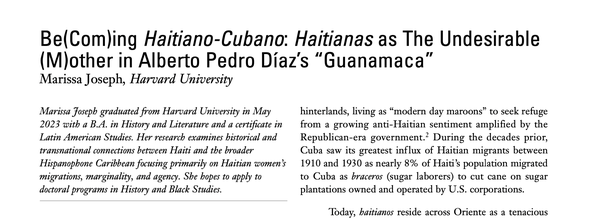
Be(Com)ing Haitiano-Cubano
Closely examining “Guanamaca,” a 1962 state-sponsored
ethnographic study of a Haitian settlement in
post-Revolution Cuba, this paper traces how state cultural institutions characterized haitianas, women of Haitian descent, as bulwarks of ethnic difference, locating their embodied diasporic memory as an obstacle that restricted the realization of cultural homogeneity. It interrogates the conditions and limitations involved in being and becoming, be(com)ing, integrated members of Cuban society. Ultimately, this paper seeks to contribute to a deeper understanding of the historical and cultural dynamics surrounding the Haitian presence in Cuba. It provides insights into the discourses of cultural assimilation, the complexities of shaping national identity, and the categories of exclusion that emerged following the Cuban Revolution.
ethnographic study of a Haitian settlement in
post-Revolution Cuba, this paper traces how state cultural institutions characterized haitianas, women of Haitian descent, as bulwarks of ethnic difference, locating their embodied diasporic memory as an obstacle that restricted the realization of cultural homogeneity. It interrogates the conditions and limitations involved in being and becoming, be(com)ing, integrated members of Cuban society. Ultimately, this paper seeks to contribute to a deeper understanding of the historical and cultural dynamics surrounding the Haitian presence in Cuba. It provides insights into the discourses of cultural assimilation, the complexities of shaping national identity, and the categories of exclusion that emerged following the Cuban Revolution.



